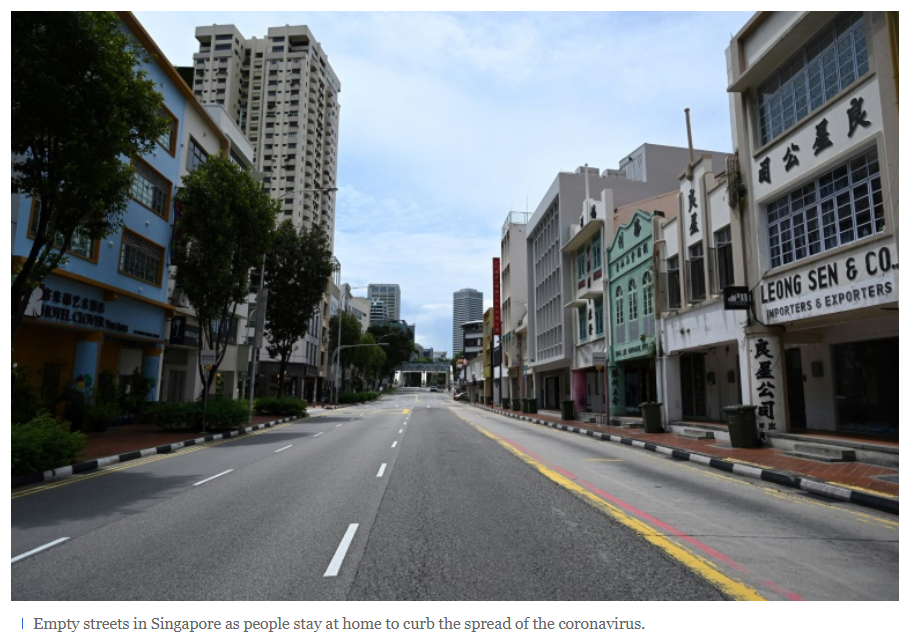Singapore economy could contract 7%, most since independence
Singapore’s economy is facing its worst contraction since independence more than a half-century ago as the coronavirus outbreak and measures to contain it pummel the trade-reliant city state.
The government expects gross domestic product to shrink 4% to 7% this year, down from a previous forecast of a 1%-4% contraction, as the outlook for external demand deteriorates, the Ministry of Trade and Industry said in a statement Tuesday.
“There continues to be a significant degree of uncertainty over the length and severity of the Covid-19 outbreak, as well as the trajectory of the economic recovery, in both the global and Singapore economies,” said Gabriel Lim, permanent secretary for the MTI.
As one of the world’s most open economies, Singapore has been severely hit by the slump in global trade and travel amid the coronavirus outbreak. Deputy Prime Minister Heng Swee Keat is set to unveil a fourth stimulus package in Parliament later Tuesday to further counter the economic pain.
Singapore’s gloomy outlook follows downbeat economic news elsewhere in the region over the past week. China abandoned an annual growth target for 2020 and pledged more stimulus, especially targeting employment. Japan saw consumer prices decline in April for the first time in more than three years, while India’s central bank expects GDP to contract for the first time in more than four decades.
The downgrade in Singapore’s growth outlook was despite an improvement in first-quarter GDP, which declined an annualised 4.7% from the previous three months, far better than the 10.6% drop estimated earlier. That was mainly due to growth in pharmaceuticals manufacturing, which helped offset the slump in electronics.
Gradual Recovery
With the “circuit-breaker” restrictions on residents’ movements taking effect only in April, “the real damage will be from the second quarter onward,” said Vishnu Varathan, head of economics and strategy at Mizuho Bank Ltd in Singapore. “Reasonable doubts about the speed and amplitude of demand recovery cannot be brushed aside.”
Singapore will begin easing the circuit-breaker measures from June, to be replaced by a three-phase system to further reopen the economy.
“How the Singapore economy performs in the second half of 2020 will depend in part on whether we are able to continue to contain the domestic outbreak after we emerge from the circuit-breaker period,” Lim said in an online briefing to reporters.
While the economy will gradually recover over the second half of the year, labour market conditions are expected to deteriorate, according to the Ministry of Manpower. There is “considerable uncertainty” and the country must be prepared for retrenchments, it said.
The new growth forecast “likely reflects expectations that the easing of the lockdown to contain the coronavirus needs to be much more gradual, hamstringing the economy for most of the year. The risk of a second global wave has also increased as countries re-open.”
Heng said Tuesday’s stimulus package will focus on jobs and skills training. He’s already delivered more than S$60 billion ($42 billion) of fiscal support to help cushion the blow for businesses and households. President Halimah Yacob has also given her in-principle approval for the government to draw on its past reserves for the fourth package.
“The lifting of the circuit breaker is very slow,” which likely means the “recovery may not come until the fourth quarter,” said Frances Cheung, head of Asia macro strategy at Westpac Banking Corp in Singapore.
Singapore’s central bank, which took unprecedented easing steps in March to bolster the economy, sees monetary policy as appropriate, with the next review scheduled for October, Deputy Managing Director Edward Robinson said at the GDP briefing. Local interest rates will remain low given the very accommodative policies pursued by major central banks, he said.
Other Details
- GDP contracted 0.7% in the first quarter from a year earlier, better than the 1.6% decline in a Bloomberg survey of economists
- Manufacturing surged an annualized 37.3% in the first quarter from the previous three months, services plunged 13.3%, and construction contracted 21.8%
- In a separate report, Enterprise Singapore said non-oil domestic exports will probably contract 1% to 4% in 2020
Source: https://www.bangkokpost.com/business/1924460/singapore-economy-could-contract-7-most-since-independence


 Thailand
Thailand




